Whenever I talk about the intersection of theatre theory and TTRPGs, there are three big people I think of: Stanislavsky, Brecht, and Boal. There are probably some other dramaturgs out there who would say something along the lines of “But wait! You forgot to talk about Artaud’s Theatre of Cruelty, and how it-”.
No. I’m not going to do that. Not on the second newsletter, anyways. If my goal is to have people understand how dramaturgy can help our TTRPGs, I can’t throw theorist after theorist at the audience and write long-winded essays about why they should consider Meisner and Chekov and Adler. This isn’t a grad school dissertation, and you are not my academic advisor.
I’m going to dedicate a newsletter to each of the Big Three (that’s how I’ll be referring to these theorists), so we can explore their theories in-depth, asking us what this means for us as TTRPG people.
So, without further ado, let’s meet the Father of these Big Three. The God of this Holy Trinity, if it were:
Konstantin Stanislavsky
Ah, yes, Konstantin Stanislavsky. Even if you haven’t gone to theatre school, you have most likely heard of this guy. He’s the traditional “actor-calls-upon-traumatic-childhood-incident-to-create-real-emotions” guy, the one where actors think and act as if their would. I know it sounds like I have beef with him, I promise I don’t, his style of performance is just a bit too indulgent for my taste.
Brief synopsis: this guy lived during the age of naturalistic theatre, so a lot of his work revolves around theatre representing reality. We believe the actors onstage actually are their characters, and believe in the world they create onstage. This stuff is important because it gives you a bit of context as to why these people are proponents of certain ideas.
The reason I bring him up is because he can be a great resource to help you to get to know your characters. Stanislavki literally asks us to entertain the hypthothetical with the “Magic If”. Yes, I am not a barbarian halfling, but what if I was? What if I was placed into the same situation that character was? What would I do? How would I react?
Stanislavky gives us the tools to treat our characters as real. They become extensions of ourselves, and they become fully-fleshed out beings, instead of the compilation of letters on a page.
The Stanislavski Method
Stanislavsky asks actors to explore eight seperate ideas. They are the following:
The Magic “If”:
We already know this guy. I am not this thing, but if I were, how would I respond? It’s a good baseline for players and GMs to fall back on. Sometimes we’re faced with two options, something that logistically makes sense to choose, and one that our character distinctly relates to. Do you choose the thing that makes logistical sense and is safe? Or, do you pick the thing you know is connected to your character and get that sweet, sweet roleplay moment? OF COURSE YOU PICK THE LATTER. It’s cathartic. It tingles your brain. It’s fun. And if you’re the GM, and don’t know how to react to a choice your players are making, it allows you to make a quick response. How does the status quo react to what the players are doing? Does it fall in line with the rules of the world? Would they be punished in this world, even if they were doing the right thing? If you just scroll through this newsletter and don’t take away anything else, I ask you to take The Magic If with you. It’s a handy tool to have.
Given Circumstances
Given circumstances asks us to evaluate what is happening right now. Let’s go back to the halfling barbarian character I made up like two paragraphs ago. Let’s say she has a backstory where her parents went missing after her eighteenth birthday, and she’s been looking for them ever since. That information is going to inform a LOT of the choices I make as a character. If she runs into someone who promises that they know where her parents are, how does she react based on that information? I as a player look at the given circumstances laid out in front of me and make a choice based on the information presented.
Super-Objective
This is your main goal, your big want. My character wants to find her parents. That want is going to inform all of her actions, and how she achieves that want will dictate her as a person. Will she lie, deceive, and cheat to achieve her goal? Or, will she rely on her own wits and charm to figure out what happened?
Objective
The objective is what your character wants right now. In the world of theatre, the objective is what you want in whatever scene your character is in. The super-objective relates to your character’s goal in the play as a whole. Let’s use the musical Hamilton as an example. Alexander Hamilton wants to be remembered in history for the work he’s done, and everything he does will be informed by that want. In “We Know”, Burr, Madison, and Jefferson reveal that they know that money is missing from government funds, and plan to reveal that information to the public. In a moment to protect himself, Hamilton shows them the blackmail note from James Reynolds. Hamilton will do whatever he can to protect himself, because he doesn’t want to have a tarnished legacy and have some control over how the public perceives him.
Physical Action
This can be hard to translate to TTRPGs, because we mostly play them seated. But, we can still entertain how we carry ourselves as the character. This is something VERY important for GMs, who are playing multiple NPCs. If voices and accents aren’t in your wheelhouse as a GM, adjusting your body and holding it differently for each character you portray can help immensely when giving your NPCs life.
Communication
TTRPGs are collaborative stories told between players and a GM. Even if they are telling the story for an audience, they have to tell it to each other as well. We’ve all been at a table where there’s a player uninterested with the action unfolding. It feels like pulling teeth doing any scenes with them. Be interested in what’s happening and relate that to your fellow players at the table.
Subtext
What’s actually happening in the scene right now? Are characters flirting and using euphemisms for sex? Are there any undertones to a certain NPC’s monologue? What is actually going on in the scene, under the surface?
Emotional Memory
Emotional memory is something I don’t super love using at TTRPG tables. Emotional memory is the calling upon real things that have happened to you that made you feel the same way. It’s something that can work when you have to memorize lines and blocking, but the TTRPG world is deeply based in improv. I don’t know about you, but I’ve been knee-deep in a scene with the GM, and I just start crying. I’m reacting in a real way to the situation presented. Instead of calling on old memories for your character, I would instead ask: how does this make this character feel? How do they react?, going back to that Magic If!
As you can see, Stanislavki loved it when we inhabited our characters.
I find that this is something that works best for players (not that GMs can’t take away anything from it!). We’re asked to fully inhabit the lives of the characters we made and make them real. It’s something exciting, to treat your TTRPG character with seriousness. You are given permission to make them real people with real problems, and they are no longer an abstract idea. Your character’s problems are real and they matter.
Once again, if you’re going to take away anything from this, just take away The Magic If. It’s something so useful, and I constantly go back to it when I have to make hard decisions as a character.
Theatre Talk
Here is where I’m putting any musicals I’m listening to and plays I’m reading. You’re in luck, because I have two!
Listening to: American Psycho (Original London Cast Recording)
The American Psycho musical did not get its flowers when it was on Broadway, which is a shame, because it looks visually stunning. It’s a great exploration of the themes in both the book and movie (I’m going to pretend I’ve read the book, but I am a huge fan of the 2000s film). The music is filled with synth and electronic beats, and the music feels surreal at times. I think it can be a little monotonous for some, but I think it deserves a quick listen to, especially the a cappella version of Phil Collins’ “In the Air Tonight”.
Reading: Dance of the Vampires
Dance of the Vampires is a German musical that had a very brief run on Broadway in 2002 (it was ahead of its time in MY OPINION). It is currently running in Hamburg as Tanz der Vampire. I’m currently going through a lot of vampire material (for secret project reasons), and I’m currently looking at vampiric musicals like Dance…
I don’t know if I can bring myself to listen to the cast soundtrack quite yet, I’m still in the thralls of reading this script (and isn’t the best adaptation of the German material). But, it’s definitely a fun read if you have the time!
See you all next week!

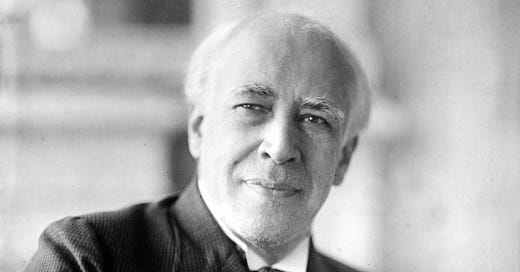









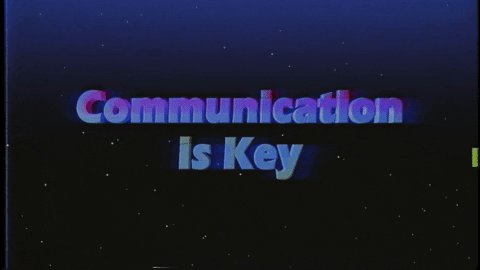
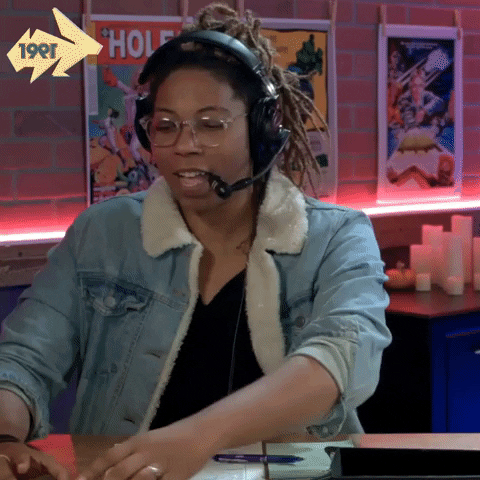

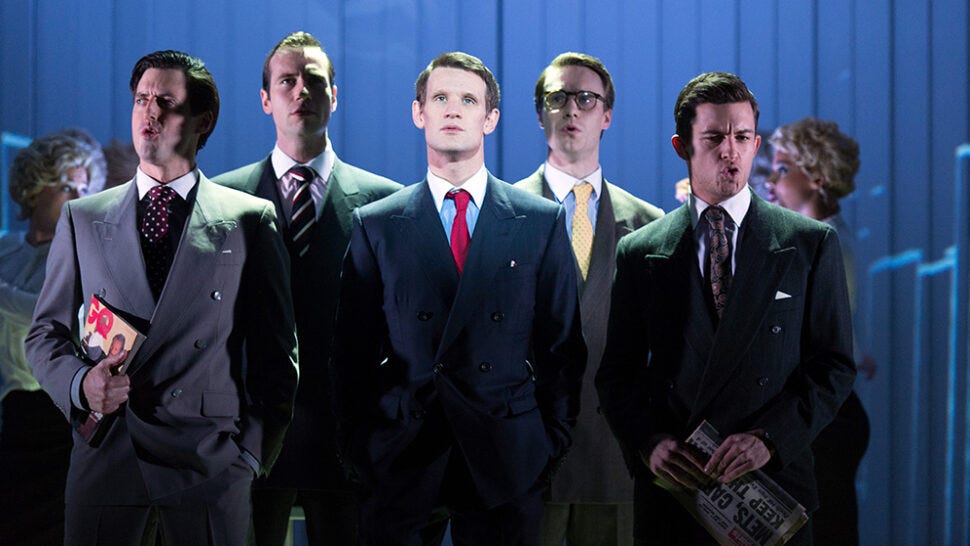
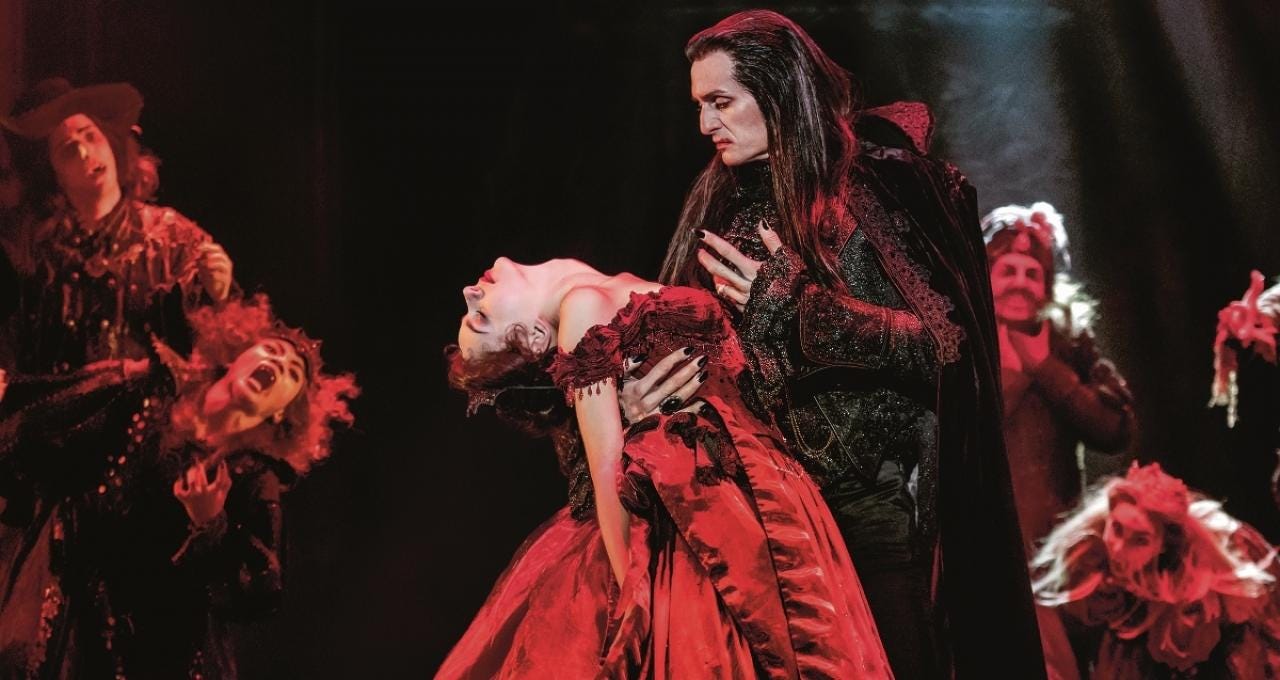
Sometimes I struggle with differentiating between doing something fun in the game because my character wants to or I want to, but either way I know that I'll have more fun doing that than not when rping :)